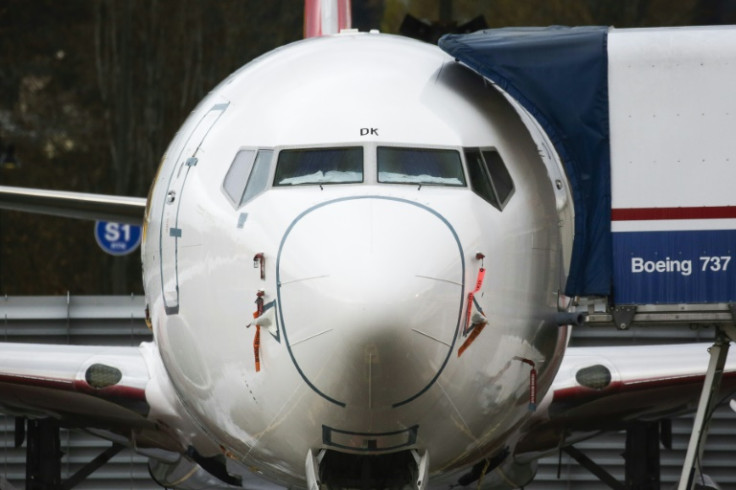Mired In Crisis, Boeing Reports Another Loss

Troubled aviation giant Boeing reported a first-quarter loss of $343 million on Wednesday, reflecting recent safety troubles that have slowed production and deliveries.
Boeing said it tempered production in the 737 program following a January near-catastrophic incident on an Alaska Airlines jet that has sparked heavy scrutiny from Washington and among Boeing's airline customers.
"Our first quarter results reflect the immediate actions we've taken to slow down 737 production to drive improvements in quality," said Chief Executive Dave Calhoun, who will step down at the end of 2024.
The extra time taken "will position us for a stronger and more stable future," Calhoun said.
Boeing's commercial airplane business suffered an operating loss, due in part to "customer considerations" of $443 million following a temporary grounding of the 737 MAX 9 after the Alaska Airlines incident, according to a Boeing securities filing.
Boeing's defense space and security division reported operating profitability in spite of losses on a pair of defense program involving a tanker and advanced jet trainer.
Revenues fell 7.5 percent to $16.6 billion.
On January 5, Boeing found itself again under intense pressure when an Alaska Airlines jet made an emergency landing after a panel on the fuselage blew out mid-flight.
Boeing announced operational changes on March 1 intended to improve its interfacing with Spirit AeroSystems, a contractor that builds fuselages for the MAX. The Alaska Airlines investigation has focused on missing bolts on the door plug.
Boeing has slowed production of the MAX to below 38 per month while it works through the inventory of fuselages that were built prior to the new inspection protocols overseen by Boeing staff who have relocated to Spirit's factory in Wichita, Kansas.
Calhoun said ensuring a "clean" fuselage from Spirit represents a key step that should enable Boeing to boost MAX production.
The company produced fewer than the 38 MAX planes allowed by the Federal Aviation Administration in the first quarter, when it burned through $3.9 billion in cash.
Boeing expects to restore output to 38 per month in the second half of 2024, which should enable the company to attain profitable cash flow for all of 2024, according to Chief Financial Officer Brian West, who said the second-quarter cash loss won't be as big as in the first quarter.
Calhoun said he was "confident" that Boeing and Spirit would ultimately be able to raise production on the MAX to 50 per month. The FAA has said it will freeze Boeing's production at 38 until the company demonstrates improvement.
Calhoun confirmed to CNBC that the company still forecasts enough of a recovery to maintain its target $10 in annual free cash flow in 2025 or 2026.
"This will cost us six months," Calhoun told the network. "I still believe it'll happen in that two-year period."
The target also anticipates that Boeing will reach production of 10 per month of the 787 Dreamliner, which is being slowed to five per month due to supply chain shortages, executives said.
The Alaska Airlines incident has undermined Boeing's contention that has fully turned around its operations after two fatal 737 MAX crashes on Lion Air and Ethiopian Airlines in 2018 and 2019.
Since the Alaska Airlines incident, an audit by an FAA advisory panel pointed to significant shortcomings in Boeing's safety culture.
Javier de Luis, an aerospace engineer who worked on the FAA review, told a Senate panel last week of a "disconnect" between the pledges of safety by Boeing management and the worry that line workers will be penalized for speaking up.
Last week, a second Senate panel heard from a whistleblower who said he was punished after raising safety questions about the 787 Dreamliner.
The FAA on February 28 announced it was giving Boeing 90 days to present a "comprehensive action plan to fix systemic quality-control issues."
Besides the departure of Calhoun, Boeing in March also announced that Qualcomm CEO Steve Mollenkopf will serve as the company's new chair.
Boeing has also disclosed that it is in talks to potentially reacquire Spirit, which Boeing spun off in 2005 to lower costs.
In the wake of the Alaska Airlines problem, Wall Street analysts have downgraded earnings estimates.
On Wednesday's Moody's downgraded Boeing's rating to "Baa3" with a "negative" outlook, the last notch in the investment-grade scale.
The move reflects the "inadequate performance" of Boeing's commercial airplane business, said Moody's, which expects "the headwinds buffeting commercial airplanes will now persist at least through 2026."
Shares of Boeing fell 2.9 percent.
© Copyright AFP 2023. All rights reserved.






